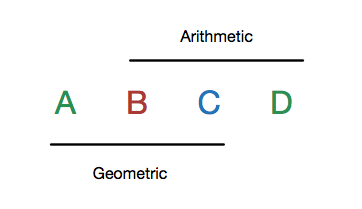AP or GP?
 In a set of four numbers, the first three are in a Geometric Progression and the last three are in an Arithmetic Progression with a common difference of 6. If the first number is same as the fourth, what is the sum of the four numbers?
In a set of four numbers, the first three are in a Geometric Progression and the last three are in an Arithmetic Progression with a common difference of 6. If the first number is same as the fourth, what is the sum of the four numbers?
The answer is 14.
This section requires Javascript.
You are seeing this because something didn't load right. We suggest you, (a) try
refreshing the page, (b) enabling javascript if it is disabled on your browser and,
finally, (c)
loading the
non-javascript version of this page
. We're sorry about the hassle.
5 solutions
Discussions for this problem are now closed
Let first term be a , common ratio be r .
Since first 3 terms are in GP, second term is a r and third would be a r 2 .
Now, we are given that last 3 are in AP, so a r 2 − a r = 6 and a r + 1 2 = a [ 4 t h t e r m = 1 s t t e r m ]
a r + 1 2 = a ⇒ r = a a − 1 2
a r 2 − a r = 6 ⇒ a × ( a a − 1 2 ) 2 − ( a − 1 2 ) = 6 ⇒ ( a − 1 2 ) 2 = a ( a − 6 )
Solving this linear equation gives a = 8 .
a r + 1 2 = a ⇒ r = − 2 1
So the sequence is 8,-4,2,8 which adds up to give 1 4
Let A , B , C , A be our desired sequence, where A , B , and C are real numbers. Since A , B , C is a geometric sequence, we have B = A C . Since B , C , A is an arithmetic sequence, we have C = 2 B + A . Substituting this value of C into our first equation, we get
B 2 B 4 B 2 A 2 + A B − 2 B 2 ( A + 2 B ) ( A − B ) A = A ( 2 B + A ) = 2 A ( B + A ) = 2 A B + 2 A 2 = 0 = 0 = − 2 B or B .
We discard A = B , since that does not satisfy the common difference of 6 criteria, so A = − 2 B , and our sequence becomes − 2 B , B , − 2 1 B , − 2 B .
Finally, we solve B + 6 = − 2 1 B , which yields B = − 4 . Thus, our sequence is 8 , − 4 , 2 , 8 , which indeed satisfy the criteria given in the problem. The sum is 1 4 .
Let the Arithmetic Progression be D-12, D-6 and D
Since the 1st number = 4th number, then, the numbers is: D, D-12, D-6, D with a sum of 4D-18
by using the ratio of a geometric progression,
(D-12)/D = (D-6)/(D-12)
D^2 - 6D = D^2 - 24D + 144
18D = 144 ---> 4D = 32
Therefore, the sum of the 4 numbers is 4D - 18 = 32 - 18 = 14 (ans)..
we have : A , B = q A , C = q 2 A = q A + 6 and D = A = q A + 1 2 . From last equality, A ( 1 − q ) = 1 2 . From third equality, q A ( q − 1 ) = 6 so with the precedent we get, − 1 2 q = 6 , hence, q = − 2 1 . Replace q in last we get, A = 3 2 × 1 2 = 8 then, A + B + C + D = 1 4
As B , C , D form an A.P with common difference as 6 ,
B=B , C = B+6 , D = B+12
Also , A = D = B+12
As A , B , C form a G.P ,
B/A = C/B ...............[ Common Ratio ]
B^2 = A * C
B^2 = (B + 12) * (B + 6)
B^2 = B^2 + 18B + 72
18B = -72
B = -4
C = -4 + 6 = 2
A = D = -4 +12 = 8
So , A + B + C + D = 8 - 4 + 2 + 8 = 14 :)